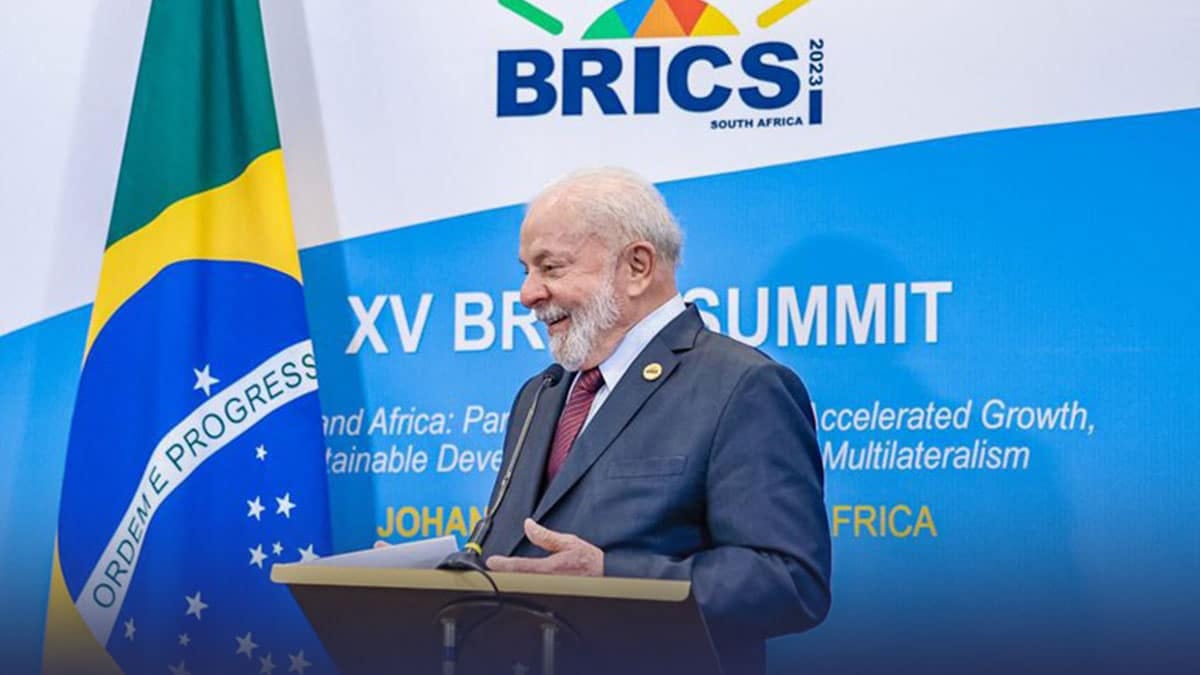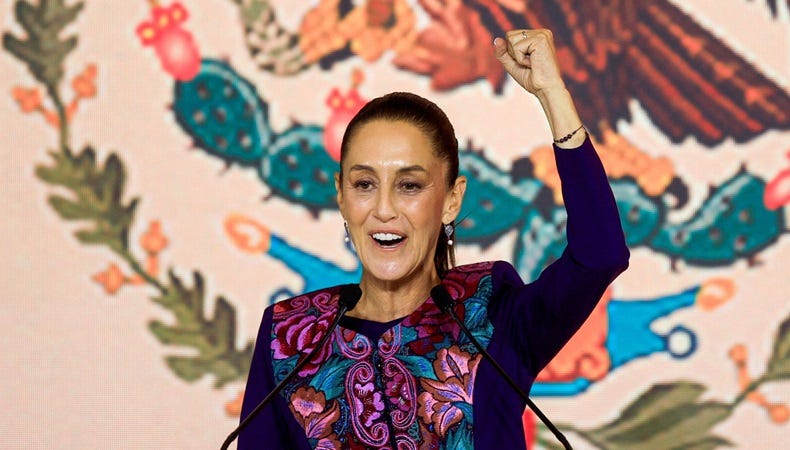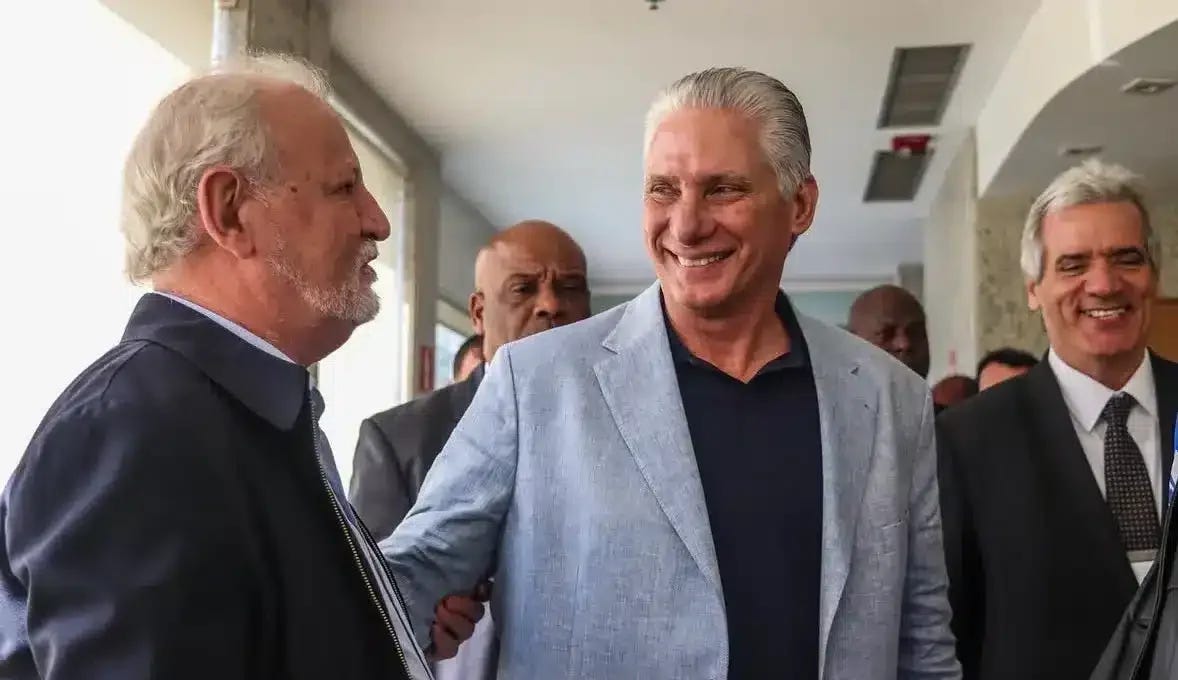As the BRICS 2025 Summit concluded in Brazil this July, political commentator and Tricontinental Institute executive director Vijay Prashad joined hosts Teri Mattson and Alina Duarte for a wide-ranging discussion on the meaning of the BRICS bloc in today’s volatile geopolitical landscape. Speaking live from Santiago, Chile, Prashad offered a critical interpretation of the summit’s declaration and its implications for the Global South.
Formed in 2009, BRICS is an acronym for a coalition of five major emerging economies: Brazil, Russia, India, China, and South Africa. The alliance was created to enhance economic cooperation among these countries and to promote a multipolar world order that challenges the dominance of Western-led institutions like the International Monetary Fund and the World Bank. In recent years, BRICS has expanded its membership and scope to include discussions on trade, security, development finance, and political coordination across the Global South.
Teri Mattson: Let’s begin with some key points from the BRICS 2025 Declaration. There were strong statements condemning unilateral tariffs, the bombing of Iran, and Ukrainian attacks on Russia. There was also a call for an unconditional ceasefire in Gaza, and Indonesia was embraced as a full BRICS member. What stood out to you?
Vijay Prashad: Every BRICS summit is a bit of a fiesta. It’s not just about the leadership meetings but also a preview of upcoming events—especially COP30, which will take place in Belém, Brazil. This summit was, in a sense, a warm-up.
The absence of China’s Xi Jinping and Russia’s Vladimir Putin was notable. Putin in particular had reason to avoid Brazil, given its ICC commitments, as the country is a signatory to the International Criminal Court and thus would be obligated to arrest him under the ICC’s warrant for alleged war crimes related to the conflict in Ukraine. But despite those absences, the political content of the declaration was clear: a rejection of U.S. unilateralism, a firm stance in defense of Gaza and Iran, and a call for multilateralism. These are positions grounded in international law, not ideology.
The declaration also emphasised strengthening multilateral financial and trade systems, expanding BRICS institutions, and opposing protectionist policies that destabilize global markets. The call to recognise a Palestinian state, while pragmatic and framed within existing international legal frameworks, is also a defence against the annexation of Gaza and the West Bank.
Alina Duarte: What kind of alliance is BRICS? It began as an acronym but seems to have grown into something much larger. What is BRICS really for?
Prashad: You’re right—it started in 2009 as a modest economic partnership between large Global South economies. Initially, it was about improving south-south trade, easing visas, and modest financial cooperation. But with the turbulence in the West—especially after the 2008 financial crisis and the militarization of foreign policy—BRICS began evolving.
Now, it resembles a nascent global alliance. Talks about a BRICS currency, especially one denominated in oil, have surfaced due to the inclusion of nearly all major non-U.S. oil producers. If Venezuela had not been vetoed, BRICS would resemble a counterbalance to OPEC+ that includes China and India. With nations like Saudi Arabia, Iran, and Egypt on board, the economic footprint is significant.
Mattson: You described BRICS previously as more of a “mood” than a movement. Do you still see it that way?
Prashad: Yes. There are real institutions now—the New Development Bank in Shanghai, foreign ministers’ meetings, and the Contingent Reserve Arrangement—but they lack ideological unity. You have a far-right government in India, a communist party in China, a centrist president in Brazil with a right-wing legislature, a monarchy in Saudi Arabia, and a theocracy in Iran. What unites them isn’t politics—it’s a shared sense of marginalization by the U.S. and Europe. BRICS is about asserting sovereignty and rejecting Western hegemony, not forming a bloc around ideology.
Duarte: What’s at stake in this new multipolar reconfiguration of the world? Are we seeing the formation of an alternative world order?
Prashad: Absolutely. The U.S. is reacting strongly because the stakes are high. Chinese tech is rapidly advancing, and China is now the top trading partner for many countries across Asia, Africa, and Latin America. Latin America, however, remains poorly integrated. Brazil and Mexico have more economic connections to the North than to their neighbours. That’s a lost opportunity.
A multipolar world also means shifting trade patterns. More countries are starting to trade regionally, particularly within Asia and parts of Africa. ASEAN, for example, is already moving toward using local currencies for trade. This decentralises global trade and weakens U.S. dollar dominance, which has long served as a pillar of American geopolitical control.
Mattson: You touched on regional trade and local currencies. There’s been talk of BRICS countries trading in their domestic currencies. Is this about economic strength, or is it about de-dollarisation?
Prashad: It’s both. The shift toward trading in domestic currencies protects national economies from the volatility of dollar markets. It conserves dollar reserves for strategic imports like technology or fossil fuels. For example, instead of converting rupees to dollars to pay Brazil, India could use local currency mechanisms. Later, trade imbalances could be reconciled with a multilateral system, possibly even a “BRICS chit” clearing mechanism.
This reduces transaction costs and sanctions exposure. Countries like Iran and Venezuela are already using such alternatives out of necessity. Over time, this could become a blueprint for other economies seeking financial independence.
Duarte: Mexico’s President Claudia Sheinbaum recently proposed shifting 1% of global military spending to development programs and hosting an economic summit focused on well-being. How significant is Mexico’s position?
Prashad: Mexico under AMLO and Sheinbaum has done something remarkable by reviving national development goals rooted in the country’s revolutionary history. Their emphasis on reforestation, farmer support, and regional solidarity echoes the legacy of Lázaro Cárdenas. However, Mexico’s deep economic entanglement with the U.S. makes BRICS membership impractical.
Still, these proposals matter. Redirecting a fraction of global arms spending toward sustainable development could transform the Global South. But it’s difficult to implement when countries like Iran and Russia face direct military threats. Mexico, with its unique geopolitical buffer, is well-positioned to propose such visionary ideas.
Mattson: Let’s talk about institutions. U.S. Treasury Secretary Scott Bessent recently announced plans to “reset” the IMF and World Bank to focus on development and energy. Is this a response to BRICS’ New Development Bank?
Prashad: Yes, partially. But there’s more to it. Countries like China still have shares in the IMF and World Bank and have advocated for greater influence and reform. The New Development Bank (NDB), led by former Brazilian president Dilma Rousseff, is a small but symbolic step toward financial sovereignty.
If Bessent’s “reset” means returning the IMF to its original mission—providing short-term liquidity during balance-of-payment crises—that could be constructive. But if it’s just another way to reassert U.S. control, then it will reinforce the very system the Global South is trying to transcend.
Duarte: The BRICS Declaration also called for Security Council reform and an end to the genocide in Palestine. Is a multipolar system really possible? Or are we just adding more chairs to the same table?
Prashad: The current Security Council structure is a colonial relic. Three of the five permanent members—the U.S., UK, and France—are Atlantic powers with declining global influence. There are no permanent seats for Africa, Latin America, or the Arab world.
Reform is unlikely, because the nations that benefit from the current structure won’t give up power easily. But BRICS and similar alliances are increasingly shaping global norms outside the UN framework. Whether or not the Security Council changes, the world is already evolving.
Cuban President Miguel Díaz-Canel with João Pedro Stedile of Brazil’s Landless Workers Movement.
Mattson: Final thoughts?
Prashad: Latin America is entering a volatile phase. We’ve experienced four waves of leftist progressivism since the mid-20th century. The first wave was the Cuban Revolution of 1959, which inspired anti-imperialist movements across the region. The second came with the Sandinista Revolution in Nicaragua in 1979, accompanied by the short-lived Grenadian revolution and regional solidarity efforts. The third wave emerged with Hugo Chávez in Venezuela and spread through electoral victories of leftist leaders across South America in the early 2000s. We are now in the fourth wave—a centre-left resurgence, with Mexico’s Morena project defining its most advanced edge.
The region may now face an ideological polarisation between hard right and hard left. Brazil, if Lula doesn’t secure another term, could return to far-right rule. Chile’s Communist Party is leading the charge against an emboldened right wing.
This polarisation will influence BRICS’ role in the region. But regardless of electoral swings, the mood of the Global South is unmistakable. It’s not about ideology anymore; it’s about sovereignty, dignity, and the refusal to take orders from the old powers. We are witnessing the slow evaporation of the center. For a time, the hard right may prevail in places like Bolivia and Argentina, but the left will find its footing again. In the meantime, countries like Mexico—with its Fourth Transformation under Morena—will be looked to with admiration as they navigate a more stable path. Yet, the broader lesson is clear: countries are no longer willing to accept their subordinate roles in the global hierarchy. They want to build systems that reflect their own priorities and realities, not those handed down from Washington or Brussels.







Between 'Quad' & 'BRICS', where does *Vishwaguru's 'strategic autonomy' figure!
“We have attained a high standard of living. We must seek to attain a high standard of thinking… There is nothing in the world that may be regarded as holy as eliminating anguish, as alleviating pain.”
https://griobhtha1.substack.com/p/x-rubicon-baby